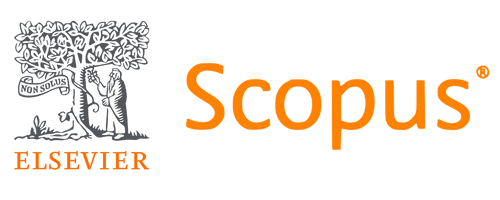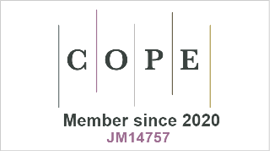JOURNAL CONTENT
Journal Policies
The journal provides its’ policies, which include detailed information about submission, editorial and publishing processes and guidelines for authors and reviewers. All parties are being introduced with their rights and responsibilities to ensure smooth and ethical publishing process. Visit following subsections for more details on each policy:
- ► Authorship + ‐
Authors are strongly advised during the submission process to correctly define the group of authors, the Corresponding Author, and the order of authors. Changes of authorship by adding or deleting authors, and/or changes in Corresponding Author, and/or changes in the order of authors are not accepted after acceptance of a manuscript.
Please note that the names of the authors will be published exactly as they appear on the accepted submission.
Please make sure that the names of all authors are present and correctly spelled, and that addresses and affiliations are current. Adding and/or deleting authors during the revision stage are generally not permitted, but in some cases it may be warranted. Reasons for these changes in authorship should be explained in detail by filling the authorship change request form. Approval of the change during revision is at the discretion of the Editor-in-Chief or Managing Editor.
Anyone identified as an author must have made a substantial intellectual contribution to the research and to the writing of the article. They must be willing to take a shared responsibility in the research and in the article and approve the final version to be published. Anyone who does not fulfil these criteria but has contributed to either the research or the writing of the article should be acknowledged and thanked in the “Acknowledgements” section at the end of the article.
Ideally, the contribution of each named author should be given in a “Author contributions” at the end of each article (e.g. “Full Name of Author 1 and Full Name of Author 2 conceived the study and were responsible for the design and development of the data analysis. Full Name of Author 1, Full Name of Author 3 and Full Name of Author 2 were responsible for data collection and analysis. Full Name of Author 1 and Full Name of Author 2 were responsible for data interpretation. Full Name of Author 3 wrote the first draft of the article.”).
Information about article preparation and how to submit can be found here: Guidelines for Authors - ► Authors' Warranties + ‐
All authors are responsible for ensuring that:
- ► the manuscript is their own original work, and does not duplicate any other previously published work, including their own previously published work;
- ► the manuscript has been submitted only to this journal; it is not under consideration or peer review or accepted for publication or in press or published elsewhere;
- ► the manuscript contains nothing that is abusive, defamatory, libellous, obscene, fraudulent, or illegal.
Non-compliance with any of the above conditions will be considered misconduct and dealt with accordingly. Equally, if authors are found guilty of infringing any of the above, the publisher reserves the right to charge the authors with costs which the journal incurs for their manuscript at the discretion of the Journal’s Editors and the publisher.
- ► Peer Review + ‐
Each submission is checked for suitability when received by the editorial office, and may be rejected without review if it is outside the scope of the journal, is obviously of insufficient quality, or is missing important sections.
The journal invites external experts (not only Editorial Board members) to review each article that is considered suitable for consideration. The publication decision is made by the Editor-in-Chief after receiving at least two external reviewer reports with recommendations.
Authors are encouraged to suggest suitable reviewers, but the Editor-in-Chief and the editorial office reserves the right to select different reviewers. The reason for asking authors to suggest reviewers is that they are best placed to know who is an expert in the field. In addition, the suggested reviewers may be suitable for other articles on the same topic. Therefore, obtaining these names can help the editorial office to ensure that it is approaching suitable people to review all articles.
The journal uses double-blind peer review (neither the authors nor the reviewers know the identity of each other) to avoid bias.
On receipt of at least two reviews, the Editor-in-Chief will make a decision of (1) accept, (2) minor revision, (3) major revision, or (4) reject. The reasons for the decision will be communicated to the authors.
When the decision of minor/major revision is made, and the authors do not revise their articles satisfactorily after receiving reviewer reports, then the Editor-in-Chief reserves the right to reject the article. When revised articles are received they will either be sent out for further review or the Editor-in-Chief will make a decision depending on the level of revision requested.
The time to review and make a decision is extremely variable since it is sometimes difficult to find suitable reviewers, and there may be delays in receiving reviewer reports. The Editor-in-Chief and editorial office make all efforts to minimize the time from submission to first decision. The journal aims to make a first decision (after review) within 60–90 days, but cannot guarantee this.
Note that articles that do not report original research (e.g. letters to the editor, editorials) are not externally reviewed and the Editor-in-Chief makes the decision to publish.
- ► Author Appeals + ‐
If an author considers that a decision of Rejection was incorrectly made, they may appeal the decision. To appeal a decision the author must email the Editor-in-Chief or the publisher, giving reasons why they think the decision was wrong. The appeal will be considered by a member of the Editorial Board who was not involved in the original decision (nominated jointly by the Editor-in-Chief and the Publisher). There is only one chance to appeal, so it is very important that authors clearly explain the justification for making an appeal.
- ► Articles in Press + ‐
As the article is ready for publication, it will be published on the Journal website as “Article in Press” with its own publication date as follows: “Published in Issue: the date when placed on the Journal server”. Later the article will be moved to the Regular or Special Issue.
Each article receives an international identification code – the “Digital Object Identifier” (DOI), which is registered with the International DOI Foundation and is unique.
Articles published as “Article in Press” (online first) are citable by Journal Title (Transport) and DOI (https://doi.org/10.3846/transport.****.****).
“Article in Press” appear in their final form. Therefore, the papers cannot be changed or withdrawn after the electronic publication. Any corrections that might be necessary have to be made in an “Erratum”, which will be hyperlinked to the article.
- ► Supplemental Information + ‐
The journal can accept supplementary files that support the submitted article (e.g. audio, movie, or text files: for example a survey questionnaire which is described in the article). Supplemental information should be provided with the submission. It will not be formally reviewed but will be considered to determine whether it is required by the article. Please note that authors take fully responsibility for the content of any supplemental information, and a disclaimer on the supplemental information must clearly state that they have not been formally reviewed.
- ► Data Sharing + ‐
We encourage all researchers to archive and share their data. Several grant funders now require this, and we believe that it benefits research by enabling other researchers to reuse and reinterpret data for the benefit of all. We encourage all authors to make their data available in suitable repositories (for example FigShare, or other similar repository) where the item will be safely archived and given a unique reference number (DOI or similar), so that it can be cited in the authors’ articles.
- ► Permissions + ‐
Authors are responsible for obtaining permission to reproduce anything (e.g. figure, table, text) that has been previously published or created by another person. On request from the Editorial Office or Publisher they should be able to supply evidence of such permission.
- ► Conflict of Interest + ‐
A Conflict of Interest (COI) is defined as a situation where personal relationships (e.g. friend, colleague or family), business relationships (e.g. working in a competing company), or financial influences (e.g. funding) will affect the judgement of any person during the publication of the journal. Authors are required to declare (within the article and to the Editor-in-Chief) any COI that may have affected their research (e.g. funding) or decision to submit to the journal. Reviewers are required to declare if they have any COI that may affect their judgement of any article they review. The COI may not prevent them reviewing the article, but must be declared to the Editor-in-Chief as soon as it is known. Editors are excluded from any publishing decision in which they may have a COI. For example, if an article by a colleague of the Editor-in-Chief is submitted to the journal, the peer review and all editorial decisions will managed by another editor.
- ► Plagiarism and Copyright Infringement + ‐
Authors are responsible for ensuring that their works are unique, and that they fully acknowledge the source of any content which is not entirely the authors’ own. The journal will check articles for plagiarism (i.e. reproducing any content without attribution and permission) using Crosscheck/iThenticate and considers the inclusion of plagiarised content to be misconduct by the authors.
- ► Editorial Independence + ‐
The editors have a right to select which articles to consider for publication and which to accept and/or reject without influence from the publisher or other external bodies.
- ► Editorial Responsibilities + ‐
The journal editors have a duty to treat all submissions confidentially, and to ensure that judgements are made free of bias, and in a timely manner. Decisions on which articles to be published are the responsibility of the editors who also have a responsibility not to bring the journal into disrepute (by knowingly accepting bad quality or unethical articles or by failing to comply with the journal policies). The appointment of the Editorial Board is the duty of the Editor-in-Chief.
- ► Publisher Responsibilities + ‐
The publisher has a duty to ensure the journal meets international standards with respect to technology, archiving, data protection, and ethical policies.
- ► Open Access + ‐
This journal, and the others published by VILNIUS TECH, are published Open Access under a CC-BY 4.0 licence which allows readers to reuse the content without restriction. Open Access allows for unrestricted sharing of scholarly information and helps to promote knowledge throughout the world. VILNIUS TECH supports Open Access as an equitable means of ensuring that scholarly research, usually funded by public institutions, is made available to all. Open Access publications are more likely to be discovered, read, cited, and used for future research than those published in closed journals, and we believe it is in the best interests of authors and their parent institutions, as well as the journals themselves, to make all our content freely available and reusable. Authors retain copyright in their articles, but grant VILNIUS TECH the right of the first publication.
- ► Fees and Charges + ‐
The journal is owned by Vilnius Gediminas Technical University (VILNIUS TECH) who supports the journal and the publishing operation of VILNIUS TECH.
In 2016–2019, publishing costs of papers were partially funded by the project “Publication and Coordination of Scientific Periodicals, 2016–2019” (Code No. 09.3.3-ESFA-V-711-01-0004, No. PML-2016/03). The project was implemented by the Lithuanian Academy of Sciences in partnership with Vilnius Gediminas Technical University and other Lithuanian institutions. Read more about the Project: http://www.lma.lt/eu-sf-projects
However, the majority of the cost of publication is funded by Article Publication Charges (APCs) paid by authors or their institutes. These are levied for TRANSPORT journal and cover the costs of publication to allow for articles to be made freely available Open Access to all readers, anywhere in the world.
An APC of 400 EUR applies for all peer-reviewed and accepted manuscripts (minimum manuscript extent is 6 pages; maximum manuscript extent is not limited).
Special note regarding sales tax and VAT for authors
APC is subject to VAT at the standard Lithuanian VAT rate of 21%.
According to the laws of Lithuania, the tax must be included for payers who are natural persons and only institutions can have it excluded (for European Union countries only). For institutions paying the APC, they can be transferred directly to VILNIUS TECH, excluding the VAT from the sum.
- ► Crossmark Policy + ‐
Crossmark is a multi-publisher initiative to provide a standard way for readers to locate the current version of a piece of content. By applying the Crossmark logo is committing to maintaining the content it publishes and to alerting readers to changes if and when they occur. Clicking on the Crossmark logo will tell you the current status of a document and may also give you additional publication record information about the document.
- ► Corrections + ‐
If an error is discovered after publication, it will be corrected by an erratum, retraction or in-line (dated) correction. Authors and readers are encouraged to inform the publisher and Editor-in-Chief if they notice anything that should be corrected. Reported errors will be investigated by the publisher and Editor-in-Chief, and discussed with the authors. The appropriate correction will be made after this consultation. Articles will be retracted if there is evidence of unethical research, unreliable data, misconduct or plagiarism, or if there are sufficient mistakes to invalidate the article.
- ► Misconduct + ‐
VILNIUS TECH and the journal follow the recommendations and policies of the Committee on Publication Ethics (COPE) regarding ethical policies and dealing with misconduct. Misconduct includes falsifying data, plagiarising others' works, and breach of confidentiality. Each case will be considered by the publisher and Editor-in-Chief, and in all cases the author (or reviewer) will be contacted directly. However, the publisher reserves the right to speak directly to the author's or reviewer's institution or other appropriate organization if severe misconduct is suspected.
Note that if misconduct is suspected during the review process the manuscript will be held until any concerns have been resolved. If misconduct is confirmed during the review process the manuscript will be immediately rejected. If misconduct is proved after publication then the article will be retracted.
- ► Complaints + ‐
Where an author, reviewer, reader, or other person has a complaint against the journal or editors, they should speak directly to the publisher in the first instance. Wherever possible, the complaint will be dealt with by the relevant publishing or editorial person. Where a resolution is not satisfactory it will be passed to a more senior person for resolution.
- ► Privacy Policy + ‐
JournalContent
quicklinks
About Journal








